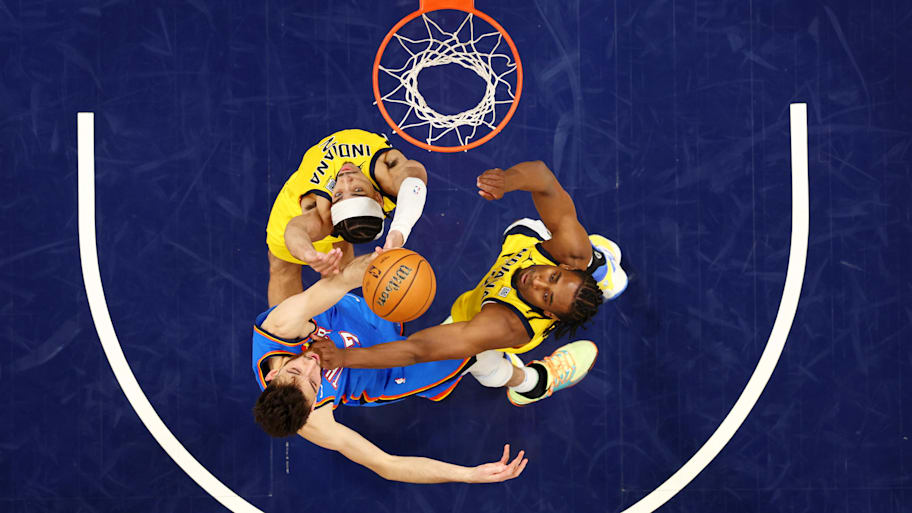
OKLAHOMA CITY — Mark Daigneault hopped onto a dais on Saturday—or stepped, or shuffled, or whatever someone whose season has stretched into its eighth month and 105th game does at the end of it—and addressed what will likely determine the outcome of Sunday’s Game 7 of the NBA Finals: Effort. Energy. Will. Six games, three wins apiece, and these two teams, relative strangers before the start of this series, now have master’s degrees in each other.
“The work is done,” the Thunder coach said. “The muscle is built. We have to flex that muscle. That’s what tomorrow will come down to for us.”
So many statistics have determined the outcome of games in this series. Turnovers. Three-point percentage. Bench points. There have been adjustments. Oklahoma City reinserting Isaiah Hartenstein into the starting lineup in Game 4. Indiana abandoning its full-court pressure for stretches in Game 6. As competitive as the individual matchups have been on the floor, so has the coaching battle been off it.
Yet each of these games has often come down to intangibles. Which team plays with force. Which team imposes its will. The Thunder did it in Game 2, coming away with a 16-point win. The Pacers responded more physically in Game 3, outmuscling the Thunder to win by nine. It has been, said Daigneault, “a contest of wills.”
“I think the reason it swung between the two teams is because these are two teams that have leaned on that heavily to get to this point,” Daigneault said. “It’s two teams where the whole is better than the sum of the parts. It’s two teams that are highly competitive. Two teams that play together. Two teams that kind of rely on the same stuff for their success that are squaring off against each other.”
Indiana won that contest in Game 6. Facing elimination, the Pacers played with desperation. With a chance to clinch a title, the Thunder played tentatively. Indiana attacked the paint, bodied up on the perimeter and forced turnovers. Oklahoma City dribbled the ball into traffic, tossed up ill-advised threes and took tough, contested shots.
As Shai Gilgeous-Alexander said afterwards, “We got what we deserved.”
Still, Oklahoma City has reasons to be confident in its ability to bounce back. It has before. The Thunder lost Game 6 in Denver in the conference semifinals. They responded by thumping the Nuggets in Game 7 on their home floor. They faced adversity already in this series, needing a furious rally in Game 4 to avoid a 3–1 hole. Home teams are 15–4 in Game 7 of the NBA Finals. The advantage matters. And Oklahoma City has a great one.
“I think through our experiences throughout the whole season and the postseason, no matter how big the moment or the game, it always comes down to the same things,” said Gilgeous-Alexander. “When we go back and watch film or we go back and look at the numbers from the game, it always goes back to the things that we know we can control every night. When we do those things, we look like a pretty good team. When we don’t do those things, we look like a bad team.”
In Game 6, the Thunder looked bad. Very bad. The aggressiveness that defined their success was gone. “I feel like we watched a lot of plays be made in Game 6,” Chet Holmgren said. The defense, the NBA’s best during the regular season and the playoffs, got carved up. The moment, a chance to win Oklahoma City’s first NBA championship, proved too big.
“You certainly want to learn the lessons, get the game plan into the game, but not at the expense of aggressiveness, confidence, instincts,” Daigneault said. “I think that has been a strength of ours this season. We certainly have to lean on that.”
Indiana will, too. The Pacers were quick to downplay the significance of the Game 6 win. “We’ve got the ultimate test coming up,” said Tyrese Haliburton. There will be adjustments. How they defend Gilgeous-Alexander, how they spring Haliburton, how they deploy T.J. McConnell, who has terrified Oklahoma City’s offense all series. But this will be about meeting the moment.
“The controllables are the most important thing here,” Haliburton said. “Taking care of the ball, rebounding, playing with the right energy. I think something that’s an underrated aspect of the game of basketball is momentum. When you’re on your home floor and you make a tough shot or have an alley-oop dunk or make a highlight play of some sort that gets the crowd involved, that momentum goes your way.
“I feel like we have that with our home court advantage, as well, in Indy. They have that here. You’ve got to be able to weather the storm with those momentum-swinging plays, try to create momentum-stopping plays when you’re on the road.”
Some 18,000-plus fans will pack Paycom Center on Sunday. The energy will be palpable. The Thunder have fed off that energy before, but they can’t allow it to overwhelm them. The Pacers have stunned crowds like this but can’t afford to fall into another deep hole. The coaching has been brilliant, on both sides, but this game, said Alex Caruso, will be “largely decided by the players.” Energy, effort, will, all that will matter in the season finale.
“It has to be an emphasis,” Gilgeous-Alexander said. “It has to be the top of our mind. It has to be all we care about, and above all, we just have to want to do it. We just have to have a sense of urgency in that part of the game.”
More NBA Finals on Sports Illustrated
This article was originally published on www.si.com as Keys to NBA Finals Game 7: Energy, Effort and Will.







